
IN CONTEXT
Realism
Social contract
1578 The concepts of sovereignty and the divine right of kings emerge, influenced by The Six Books of the Republic by Jean Bodin.
1642–51 The English Civil War temporarily establishes the precedent that the monarch cannot rule without the consent of Parliament.
1688 The Glorious Revolution in England leads to the 1689 Bill of Rights, which limits the powers of the monarch in law.
1689 John Locke opposes absolutist rule, arguing that government should represent the people and protect their rights to life, health, liberty, and possessions.
The Enlightenment period that followed the Middle Ages in Europe introduced new views on human nature that were not based on religious doctrine, but were instead founded on rational thought. Disagreement between some Enlightenment thinkers often derived from differences in opinion concerning the true nature of the human condition and human behavior. To settle such abstract, fundamental differences, scholars began to state their views on the so-called “state of nature”—the theoretical condition of mankind before the introduction of social structures and norms.
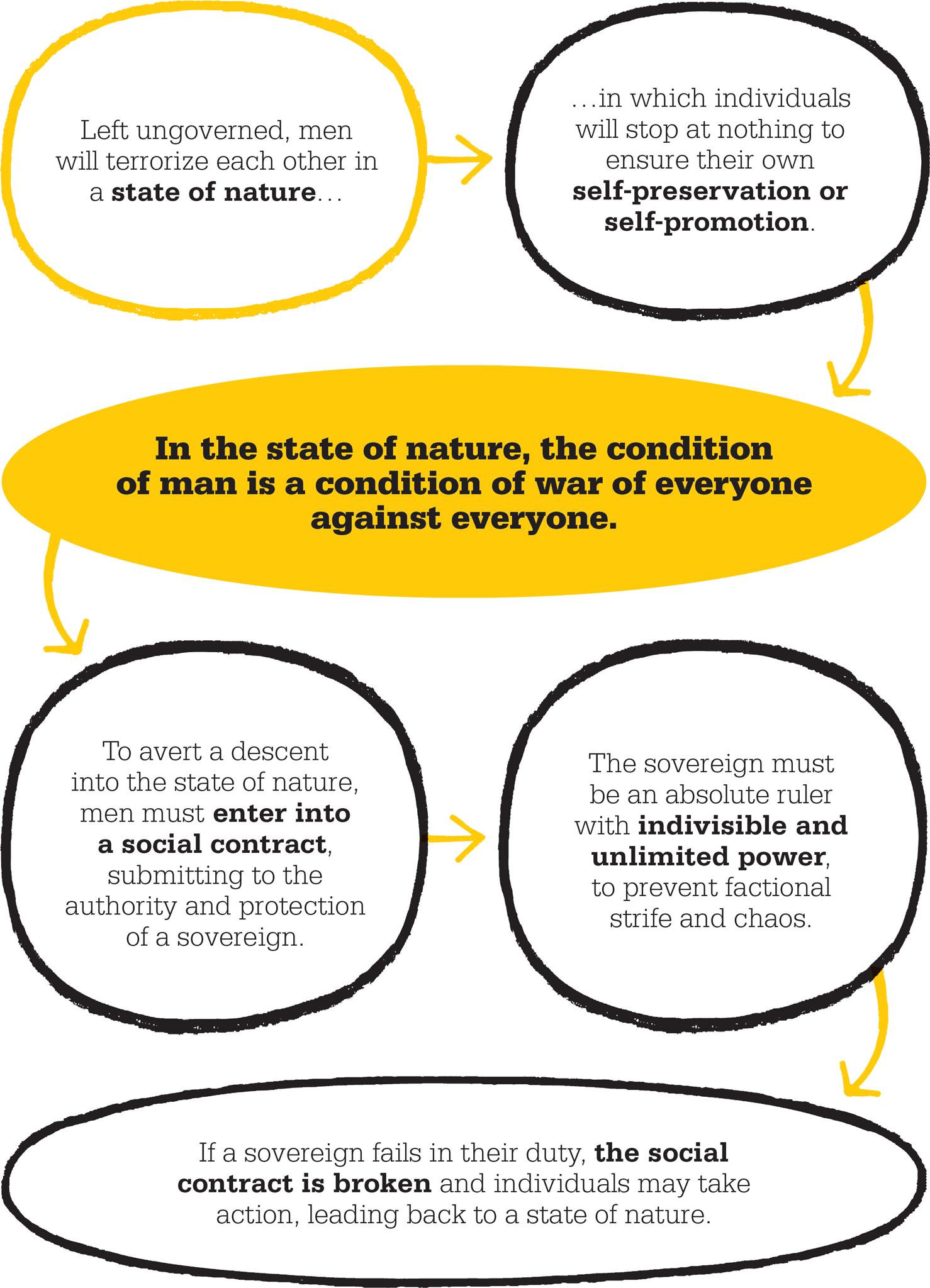
Many thinkers believed that by analyzing the human “instincts” and behaviors of this state of nature, one could design a system of government that met the needs of its citizens and would promote good behaviors and counteract bad ones. For example, if humans were able to see beyond narrow self-interests and work for the public good, then they could enjoy the benefits of democratic rights. However, if they mainly cared about their own interests and maximizing their own power, then a strong, controlling authority was required in order to prevent chaos. English writer Thomas Hobbes was one of the first Enlightenment philosophers to base his argument explicitly on an articulated view of the state of nature. Hobbes’s view was that human beings needed to be ruled by government, as the state of nature was a terrible, “dog-eat-dog” world.
The cruel state of nature
In his most famous work, Leviathan, Hobbes portrays humans as rational agents who seek to maximize power and act according to self-interest, because acting otherwise would threaten their self-preservation. The title is suggestive of Hobbes’s views on the state and human nature. Leviathan is the name of a monster in the biblical book of Job, and for Hobbes the state is the “great Leviathan… which is but an Artificial Man; though of greater stature and strength than the Natural, for whose protection and defence it was intended; and in which, the Sovereignty is an Artificial Soul, as giving life and motion to the whole body.” The state is thus a cruel, artificial construct, but is necessary nonetheless for the sake of the protection of its citizens. The book was written during the English Civil War (1642–51), and argues against challenges to royal authority. The state of nature—the warring of all against one another—was for Hobbes comparable to civil war, and could only be avoided if men handed over their arms to a third party—the sovereign—via a social contract that ensured that all others would do the same. The reason rational agents would surrender their freedom to an absolute ruler was that life in the state of nature was so “solitary, poor, nasty, brutish, and short” that freedom would always be a secondary concern, an ill-afforded luxury. Hobbes stated that while people would have natural rights in such a state of nature, the overriding concern would be to do whatever was necessary to secure survival. All actions could be justified—rights would not protect the individual.
"Without a common power to keep them all in awe, they [men] are in that condition called war."
Thomas Hobbes
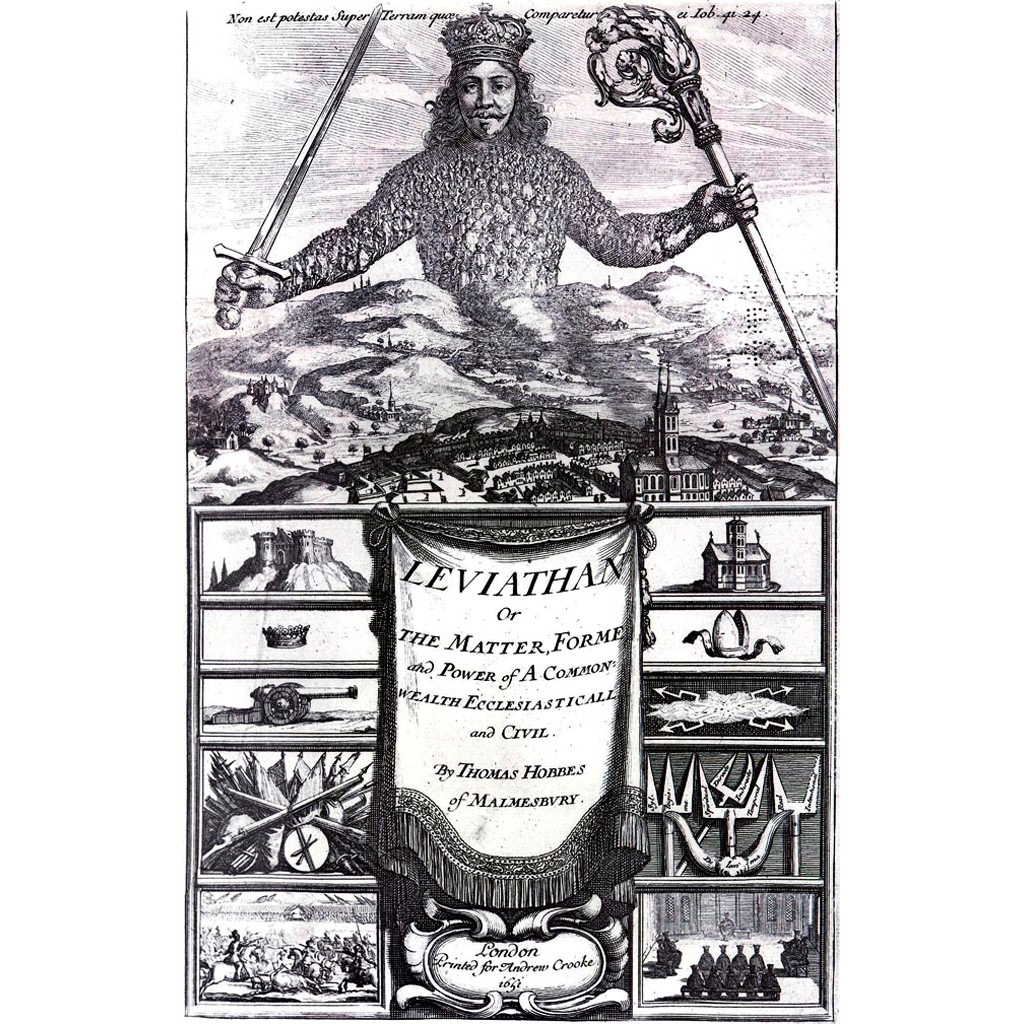
The frontispiece of Leviathan depicts a ruler, composed of tiny faces, rising up over the land and holding a sword and scepter, symbolizing earthly and ecclesiastical powers respectively.
Rule by social contract
With no common authority to solve disputes or protect the weak, it would be up to each individual to decide what he or she needs—and needs to do—to survive. In the state of nature, men are naturally free and independent, with no duties to others. Hobbes assumes that there will always be a scarcity of goods, and that people are equally vulnerable. Some people will go into conflict to secure food and shelter, while others will be willing to do so in order to obtain power and glory. A state of constant fear will ensue, leading to preemptive attacks.
Hobbes sees this state of war and chaos as the natural end point of uncontrolled human freedom. In order to prevent it, the state needs to have indivisible power and authority to control its subjects. This is similar to a description of sovereignty by French jurist Jean Bodin, which was also born out of a period of civil war. However, Hobbes did not base authority on the divine right of kings, but on the idea of a social contract that all rational people would agree upon.
While the concept of man’s state of nature was deeply influential among Hobbes’s contemporaries and future political theorists, it was often interpreted differently. Hobbes used the state of nature to refer to a hypothetical situation, a sort of rational reconstruction of how life without order and government would be. This differed from the way later thinkers, including John Locke and Jean-Jacques Rousseau, would use the concept in their own works on the social contract and ideal forms of government. Locke and Rousseau did not consider the state of nature to be a rational construct, but an actual state of affairs.
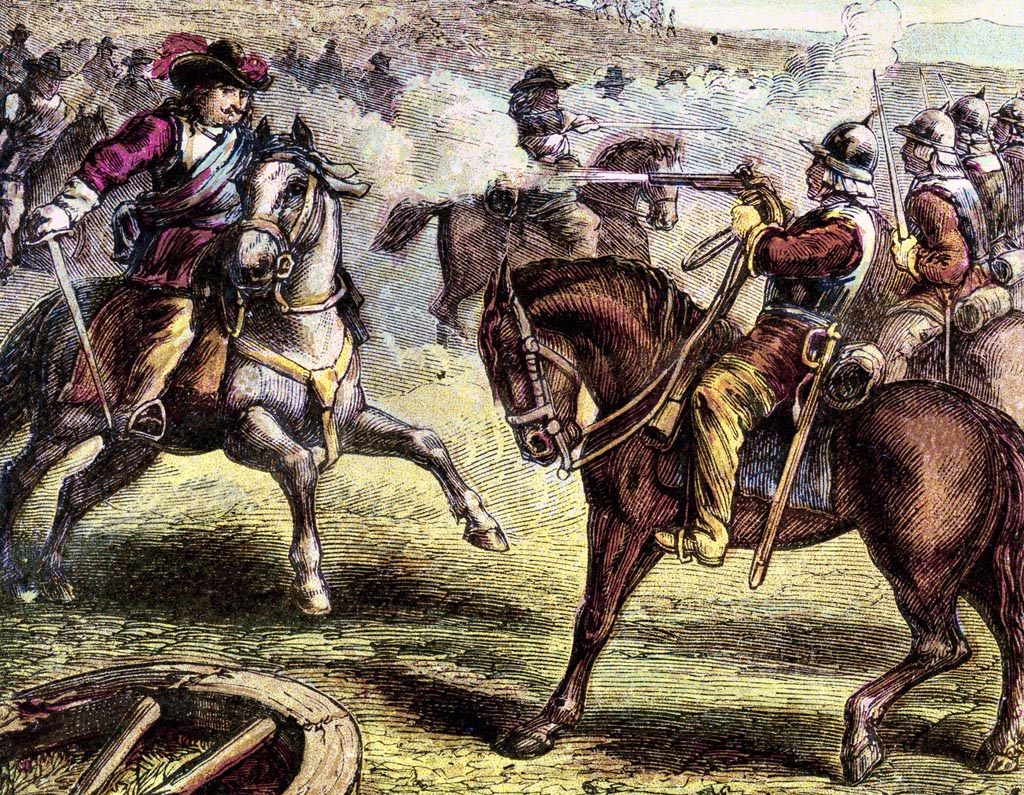
Hobbes wrote Leviathan as the English Civil War was waged. His view of the “state of nature” that a sovereign protected against seemed to be borne out by the savagery of the war.
A necessary evil
Enlightenment thinkers referred to the concept of a social contract between the ruled and the ruler to answer questions of the political legitimacy of various modes of governance. To rule legitimately, there must be either an explicit or tacit agreement that the sovereign will protect his citizens and their natural rights if they agree to surrender their individual freedom and submit to subordination.
Hobbes argued that humans had two principal choices in life—they could either live without government (the state of nature) or with government. For Hobbes, a social contract bestowing indivisible authority to a sovereign was a necessary evil to avoid the cruel fate that awaited man if a strong power could not keep the destructive impulses of individuals in check. Hobbes believed that, “During the time men live without a common power to keep them all in awe, they are in that condition called war; and such a war, as is of every man, against every man.” However, unlike earlier scholars who had argued for the divine right of kings to rule, Hobbes truly saw the relationship between the ruled and the ruler as contractual. The contract was primarily made between the individuals in a society, while the sovereign was an outside, third party.
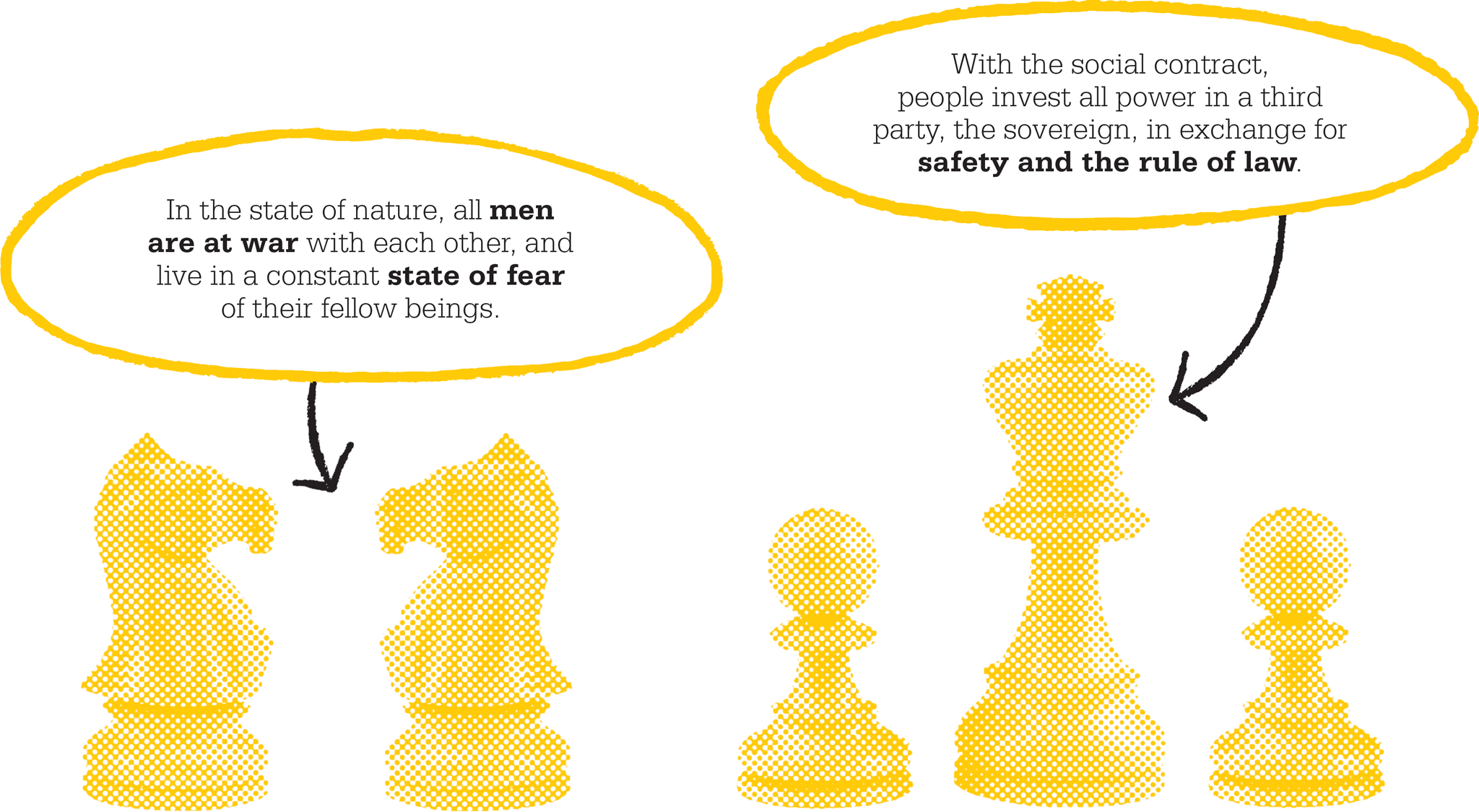
Hobbes saw the state of nature as undesirable, stating that the people must willingly subject themselves to a ruler or sovereign in order to protect society.
Collective action
Because people are rational, they can see that the state of nature is undesirable, and that peace is good. However, because each individual has to protect their own interests in the state of nature, a “collective action problem” arises. Although Hobbes did not coin this term, his dilemma of individuals in the state of nature not trusting each other to lay down arms is very similar to this modern concept, where a problem exists that can only be overcome if individuals—all of whom stand to gain from the successful outcome—act collectively. Hobbes’s solution was radical: invest all power in a third party—the sovereign. Contemporary scholars have identified many ways in which individuals overcome collective action problems without the need for a strong government. British philosopher Margaret Gilbert has suggested that collective action involves joint commitment to a course of action in which, in effect, people act as parts of one person with one aim. Nevertheless, governments are still the main regulators of conflict and providers of public goods.
"The obligation of subjects to the sovereign is understood to last as long, and no longer, than the power lasteth by which he is able to protect them."
Thomas Hobbes
Hobbes’s contractual view of government authority also affected the duties of the sovereign. Only so long as the sovereign could protect his subjects were they bound by the social contract. However, Hobbes did not encourage popular revolutions, nor religious influence on state matters, and he did not favor democratic rule. The main aim of government was stability and peace, not individual freedom.
Pragmatic politics
Hobbes’s views on the social contract did legitimize changes in government. When the English king, Charles I, was dethroned in 1649 by Oliver Cromwell, according to Hobbes’s thinking the social contract was held intact, since one ruler was merely replaced with another. In other words, Hobbes was an antidemocrat and an absolutist, but also a pragmatist. Although he did not take a decisive stance on which mode of government was best, he clearly preferred Charles I’s monarchy as a good, stable form of government. However, he also regarded parliamentary sovereignty as a suitable form of government, as long as the legislative assembly contained an odd number of members to prevent a situation of political stalemate.
The logic behind Hobbes’s version of the social contract was questioned by many scholars. John Locke provided a sarcastic critique by questioning why one would believe that “Men are so foolish that they take care to avoid what Mischiefs may be done to them by Pole-cats, or Foxes, but are content, nay think it Safety, to be devoured by Lions.” For Locke, authoritarian rule is just as dangerous as civil disorder—he preferred the state of nature to subordination. Hobbes believed, however, that only governments with indivisible and unlimited power would prevent the otherwise inevitable disintegration of society into civil war. For Hobbes, anyone arguing for individual freedoms and rights had not grasped that the basic security that civilized life took for granted would only endure as long as strong, centralized rule existed. Political obedience was needed to keep the peace. Citizens had a right to defend themselves if their lives were threatened, but in all other questions the government was to be obeyed to prevent factional strife or political paralysis.
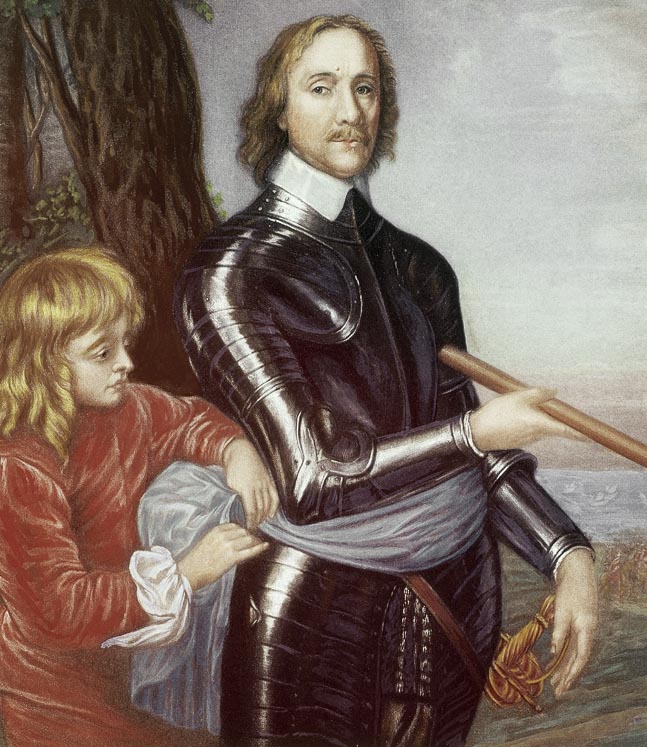
Oliver Cromwell led the anti-Royalist forces that deposed King Charles I in 1649. Hobbes believed the social contract was still intact, since rule had passed unbroken to Parliament.
Against a state of nature
Hobbes delivered a strong argument for absolutism based on his deliberations on the nature of man. His opponents—arguing against absolutism—responded by challenging his portrayal of human beings as hungry for power and strife. Jean-Jacques Rousseau saw the life of man in the state of nature in a romantic light, as a life of innocence and simplicity, in contrast to life in modern society, which was dishonest. Therefore, one should not try to escape from the state of nature, rather it should be re-created as best as possible in the mode of government. Rousseau therefore advocated direct democracy in small communities. While Hobbes lived his life with the English Civil War as a reference point, Rousseau lived in the tranquil city of Geneva, Switzerland. It is telling how their different backgrounds shaped their political theories. Unlike Hobbes, Rousseau regarded the state of nature as a historical description of man in a pre-social state of nature. Political theorists have since vacillated between the extremes of Hobbes and Rousseau, viewing the condition of man either as a condition of war or as people living in accordance with nature.
"Nothing is so gentle as man in his primitive state, when placed by nature at an equal distance from the stupidity of brutes and the fatal enlightenment of civil man."
Jean-Jacques Rousseau
Two other influential philosophers—Locke and Scottish philosopher David Hume—also criticized Hobbes. Locke writes on the state of nature in his two treatises of government (1690), and refers to the laws of nature that govern this condition. In contrast to Hobbes, he states that even in the state of nature no man has the right to harm another. Hume adds to the debate by stating that human beings are naturally social, and that the savage condition described by Hobbes is therefore improbable.

The Hobbes method
Today, scholars continue to use Hobbes’s method and the concept of a state of nature to argue for and against different political systems. John Rawls used Hobbes’s notion of what made a stable society when formulating what rational people would be able to agree upon. In A Theory of Justice (1971), Rawls argues that people would choose a condition where everyone had some basic rights and economic safeguards if forced to choose under a “veil of ignorance,” not knowing whether they would have a privileged position in this imagined society. Hobbes did not, however, theorize on the ideal society, but on the necessity of strong government. While most scholars today would consider Hobbes’s view of the human condition to be pessimistic, he maintains a significant influence on political thought. The realist tradition in international relations, which stresses the study of power, departs from Hobbes’s premise that the condition of man is a condition of war. Nevertheless, the anarchical condition that Hobbes described in the state of nature is also taken to be true for the international system, where states are the main actors. Realist views of the international system still dominate today, despite the end of the Cold War. The main difference from Hobbes’s theory is that, at the international level, it is not possible to rely on the Leviathan of the state to subdue destructive pursuits of power and self-interest. States cannot trust each other, and are therefore doomed to arms races and wars.
"To this war of every man against every man…nothing can be unjust… where there is no common power, there is no law, where no law, no injustice."
Thomas Hobbes

The Triumph of Death (1562) by Pieter Bruegel the Elder depicts anarchy breaking out as Death comes to rich and poor alike. Hobbes saw the state of nature as similarly anarchic and brutal.
THOMAS HOBBES
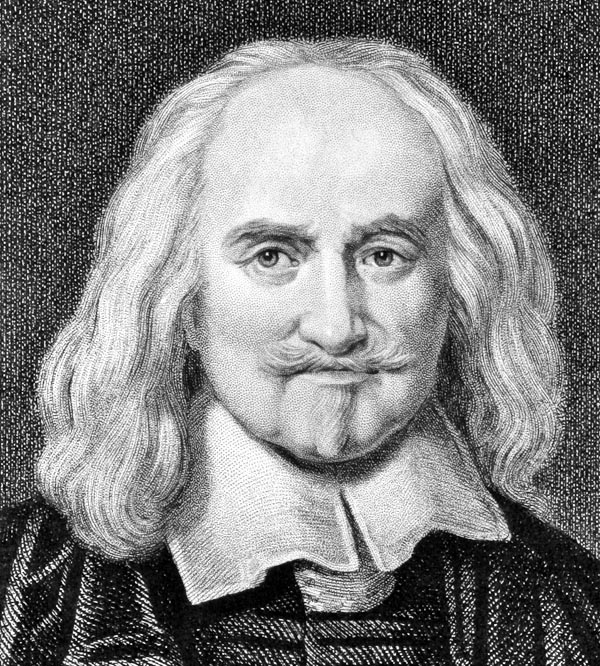
Born in 1588, Thomas Hobbes was educated at Oxford University in England and would later work as a tutor for William Cavendish, Earl of Devonshire. Due to the English Civil War, he spent a decade in exile in Paris where he wrote Leviathan, which has had a profound influence on the way we perceive the role of government and the social contract as a basis for legitimacy to govern. Hobbes’s political philosophy was influenced by his interest in science, and his correspondence with philosophers including René Descartes (1596–1650). Drawing from scientific writings, Hobbes believed that everything could be reduced to its primary components, even human nature. He was inspired by the simplicity and elegance of geometry and physics, and revolutionized political theory by applying such scientific method to its reasoning. He returned to England in 1651, dying in 1679.
Key works
1628 History of the Peloponnesian War
1650 Treatise on Human Nature
1651 Leviathan
See also: Plato • Jean Bodin • John Locke • Jean-Jacques Rousseau • John Rawls
